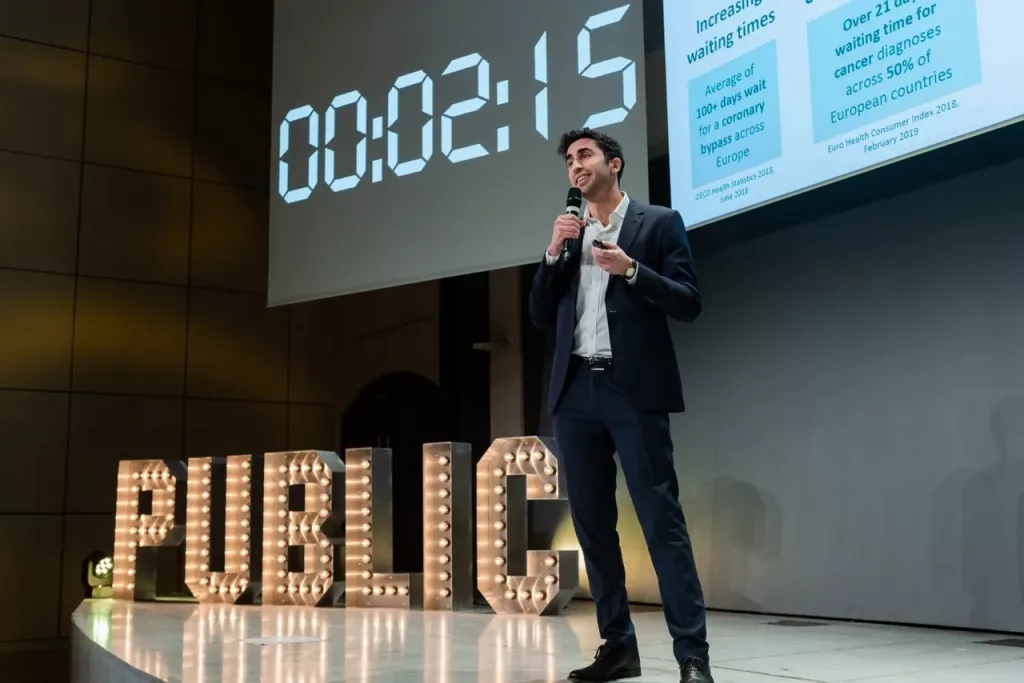29 June 2021|Brand Story, Latest Posts, Meet the Successful Founder

Dr Ahmed Shahrabani graduated from the University of Sheffield in 2014 before accepting his first medical post at St. Helier Hospital, London where he met his colleague and now Co-Founder, Dr Nicholas Andreou. Carrying across the deeply rooted values of transparency, honesty and with a sharp focus on patient care they embarked on a mission to solve the NHS staffing crisis by providing solutions for NHS staff to work flexibly and stay in the jobs they love. He was recently recognised by Forbes for his role at Locum’s Nest, as one of the 30 under 30 Healthcare & Science leaders destined to shape their field in the next 50 years. We were delighted to catch up with him recently to discover more about his entrepreneurship journey.
Can you tell us a little about your background and the company?
I am a practising Doctor by trade and Co-Founder of Locum’s Nest. I was born in Oman in the Gulf of Arabia and moved to delightful Sheffield in South Yorkshire, where I studied at Sheffield medical school before moving down to London to do my foundation year at Epsom and St Helier. I did my 2nd foundation year at the Royal Surrey, where I worked for a few years. I then took a few years out of medical practise to Co-Found Locum’s Nest with Dr Nicholas Andreou in 2015.
In March 2020, I became a fellow of the NHS Innovation Accelerator (NIA) which supports individuals with a passion for and commitment to scaling their innovations for greater patient and population benefit, and for sharing their learning, insight and expertise widely. All the innovations in the 2020 cohort have been carefully selected and represent high-impact, evidence-based solutions which will be supported to scale nationally by the NIA and the Academic Health Science Network for the next 2 years.
Ever since the Covid-19 pandemic hit in March 2020, I reinstated my license to practise and returned to the front line, working as an Acute Medicine physician on Covid wards during weekends.

How did the idea come to you for the company?
The story of Locum’s Nest was born from our personal experience as junior doctors in the NHS in Epsom and St Helier Hospital where I worked with Dr Nicholas Andreou. Every Friday, the rota coordinator would come to the ward and ask one of us to cover the afternoon shift on the following Sunday. If the consensus was “no” then what followed would be a barrage of texts, emails, phone calls, bleeps to try to find cover as ultimately it is clinical safety that is affected. If no one was found through the full-time employees’ spreadsheet or the staff bank, the rota coordinator would resort back to phone calls, emails, texts etc to a long list of local recruitment agencies. Basically, it was a convoluted process that cost a lot of time and a lot of money. As clinicians, we didn’t like it and the core HR team were spending too many hours with very little luck in finding a doctor.
We thought there must be a better way of doing this and, as with other industries, the idea was born to cut out the middleman with technology. Between us, we spent all year working with the hospital to ask the question, ‘what should the solution look like?’
We built a free-to-use mobile application for doctors, which had features such as a built-in digital passport to allow doctors to cross hospital borders – they could input important information like their speciality, credibility etc and link it to various calendars and rosters. They would then be notified of shifts that matched their requirements 100%. Rather than being bombarded with all jobs available, the application filtered jobs that were only applicable to their skillset and availability.
That was 5 years ago, and the application was very different back then to what it is now. Now the platform works not just with doctors, but with nurses, pharmacists, physiotherapists and all other allied healthcare professionals.

How did you achieve awareness?
The platform’s beauty and simplicity really helped alongside the relentless hard work of the team. Word of mouth has also played a major role in spreading awareness as our partners can truly testify to the seamless user experience on both our mobile and web apps to others – something which is reflected in our app ratings and the positive feedback we keep getting from our users. We were fortunate enough to not need heavy marketing investments and we simply let the technology, our customer service and feedback do all the talking.
How have you been able to gain funding and grow?
We achieved our series A investment in 2018 backed by two VCs: Albion Capital (UK) and IDO (Oman). It was a mix of perseverance, tenacity and being able to say no to investing partners that didn’t share our values that allowed us to be where we are today.
What are the key successes?
Without question, it has been the creation of The Digital Collaborative Bank, the biggest workforce coalition of NHS Trusts in the country. This collaborative way of honest and flexible working in the NHS started off with two NHS Trusts and has now grown to ten, all working collaboratively across the south of the country; all the way from North Middlesex down to Dorset County, Dorchester to Gloucester and almost everything in between.
This is a super group of flexibly working doctors, over 6,000 strong who benefit from free movement using the digital passport across all of these Trusts. People say we were far-fetched and promoted a ludicrous way of thinking, but we firmly believe the NHS should have one staff bank and free movement of doctors to enable them to work where they are needed the most, which will totally irradiate agencies and save the NHS millions, if not billions. It is growing exponentially; we are expecting another eleven trusts to join shortly and now rather than trusts competing with each other, they are working together.

What were/are the challenges and how have you overcome these?
There is no magic formula to get innovation into the NHS; it is very much a people’s game.
We learnt that every NHS Trust is very different in its own right, but there are a lot of similarities that you have to empower NHS Trust by showing them what their similarities to their neighbours are. I have been to so many talks in the NHS and have shamelessly used the same quote over and over again that the NHS ‘has more pilots than the RAF and the British Armed Forces combined’.
You really have to push for the similarities between NHS Trusts, show people why they are facing the same struggles, and what another NHS Trust down the road has done, maybe able to help. You just save so much time and energy sharing learnings which doesn’t always happen unfortunately.
What are your plans now/for the future?
Scale. Fast. A few years ago, we ‘invented’ the concept of open collaborative staff banks in the NHS. The model has now proven itself to be the gold-standard and we are on a quest to create many, many more collaborative groups of NHS Trusts working together. Our ultimate vision is to create 1 National Staff Bank for the NHS. Allowing the right doctor, nurse, healthcare professional to be at the right shift at the right time – empowering them to do so in the process.
What would you like to share with others to encourage them to start their own entrepreneurship journey?
I always wanted to be a doctor growing up, I loved the job and still do love the job. But Nick and I were extremely lucky, particularly with the timings of everything that happened, in that we both seized the chance to change something significant in the NHS before NHS Improvement had officially addressed that agency spend was a problem that needed to be fixed on a national scale. We were already there with our idea. I would have still done medicine despite the success of our innovative technology.
The advice I would give to others is ‘you cannot expect life to move forward as you expect!’ – chances come up, opportunities come up and I would have told old me to take risks; the bigger the risk, the greater the reward. Embrace the challenges, embrace the tough days.
Can you share you top tips for entrepreneurial success?
Don’t be afraid of the gorillas in the pack – if somebody has monopolised an industry that you’re looking to enter but you’re confident you can do things better and more ethically, then do it. David defeats Goliath.
Believe in yourself and stick to your gut instinct.
Don’t be afraid to say no to people. Don’t waste time with ‘maybes’
Don’t enter a million and one partnerships – wait for the right ones then really make them meaningful.
Take things one step at a time, as great as the final destination may be in your head – think about what’s around that first corner, hurdle or milestone.
Who are the 5 people who inspire you the most?
Allen Swann: Our chairman. Values and principles always trump anything else, infinite respect for that.
Sir Gilbert Greenall: helped millions of people around the world on his humanitarian missions and was never a follower of rules that didn’t make sense.
My late father – Dr Rashid Shahrabani: appreciate the inherent bias but to this day I have never seen a whole community respect a man quite so much. He started the first cardiology department where I grew up, Muscat, Oman.
Ayrton Senna: nobody being the wheel compares with his raw and pure talent
Sultan Qaboos bin Said: built a modern nation from nothing more than an empty desert that allowed me to grow into the person that I am today.
What is your favourite inspirational /motivational quote?
“We have two lives, and the second begins when we realize we only have one” – Confucius.
What are your social handles and website links so our readers can connect with you?
@ahmedshahrabani
@LocumsNest
TSF Reporters
The Successful Founder Magazine is the go to feature-rich magazine for founders on all stages of their entrepreneurship journey .
- TSF Reporters#molongui-disabled-link
- TSF Reporters#molongui-disabled-link
- TSF Reporters#molongui-disabled-link
- TSF Reporters#molongui-disabled-link






